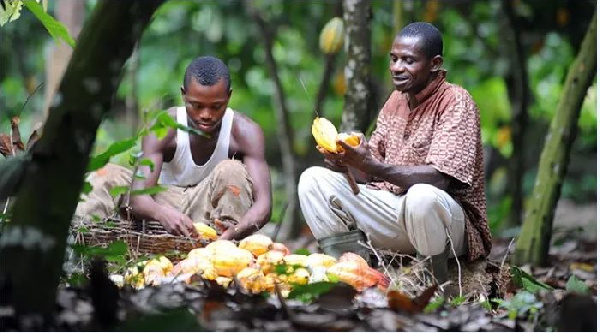The cocoa industry has experienced its second reversal in farmgate prices over the past five mid-seasons due to global developments, says the March 2023 Cocoa Market Report by the International Cocoa Organisation.
The report shows that the farm-gate prices in US$ nominal terms have been higher in Ghana than in neighbouring Côte d’Ivoire over the past five mid-seasons. However, the situation was reversed during the mid-crops for 2021/22 and 2022/23 seasons – mainly due to substantial depreciation of the cedi (GH¢) vis-à-vis the US dollar.
For the 2022/23 mid-crop, the Ivorian and Ghanaian regulators have left unchanged the fixed farmgate price at 900 XOF per kg (US$1,507 per tonne) and GH¢12,800 per tonne (US$1,206 US per tonne) respectively.
The report further indicates that the reversal of farm-gate prices in Ghana’s cocoa industry is largely attributed to the global economic challenges which have affected Ghana’s currency. The depreciation of GH¢ vis-à-vis US$ is a result of several factors – including the COVID-19 pandemic, low commodity prices and the country’s debt burden.
Cedi’s worst run
The cedi wobbled after a wave of sovereign downgrades and speculations. The GH¢ endured a torrid 2022, ending the year as the fourth worst-performing currency globally and trading at a mid-rate of GH¢11.60 /US$ (YTD loss of 44.05%). The local unit suffered from a raft of sovereign downgrades that dimmed investor confidence.
Fitch and Moody’s ratings downgraded Ghana into negative outlook territory at the start of 2022, leading to a loss of access to the international capital market (ICM). The loss of access to the ICM posed some risks to international reserves and the country’s ability to meet external financing obligations.
The cedi endured its worst run of form yet, as it depreciated 33.22 percent from Sep-22 to Nov-22 to emerge as the worst-performing currency globally. During this period, the GH¢ was quoted at 15/US$1 on the forex market as speculative attacks severely weakened the local unit.
However, the local unit gained 27.16 percent to end Dec-22; primarily due to positive sentiments from an IMF staff-level agreement, reduced speculative attacks and softened stance of the US Fed.

Despite the challenges faced by Ghana’s cocoa industry, the country has made significant strides in boosting its cocoa production over recent years. Several initiatives have been implemented to support the industry, including the Cocoa Farmers Pension Scheme, the Cocoa Rehabilitation Programme, and the Cocoa Disease and Pest Control Programme.
Ghana surpasses Ivory Coast in cocoa production
Ghana has surpassed Ivory Coast in cocoa production over the half-year 2022/23 crop season, according to the ICCO report. As of 31 March 2023, cumulative arrivals of cocoa beans in Ivory Coast were lagging behind previous season levels, while the volumes of graded and sealed cocoa beans purchased in Ghana since start of the 2022/23 season was reported at 566,846 tonnes; representing an 18 percent increase from the previous year.
Despite an increase in the country’s cocoa production, total supply of cocoa beans from the top-two world cocoa producers for the first half of 2022/23 is estimated at 2,345,846 tonnes, slightly down by 0.2 percent compared to the previous season.
The ICCO report states that the year-on-year reduction of 89,000 tonnes in Ivory Coast’s cumulative ports’ arrival of cocoa beans over the first half of the 2022/23 cocoa year, combined with the increase of 85,360 tonnes over the same period in Ghanaian purchases of graded and sealed cocoa beans, results in a slightly negative net effect.
The report also stated that the current state of play is subject to change as the mid-crop progresses. However, the current situation shows that Ghana has overtaken Ivory Coast in cocoa production; a significant development in the global cocoa market.
The domestic cocoa industry is facing significant challenges due to global developments, including depreciation of the GH¢ vis-à-vis the US$. However, the Regulator remains committed to supporting its cocoa farmers and improving the industry’s performance through various initiatives.
The reversal of farmgate prices in the past five mid-seasons is a concern, but Ghana’s cocoa industry is expected to bounce back with the right support.
Source: thebftonline.com

